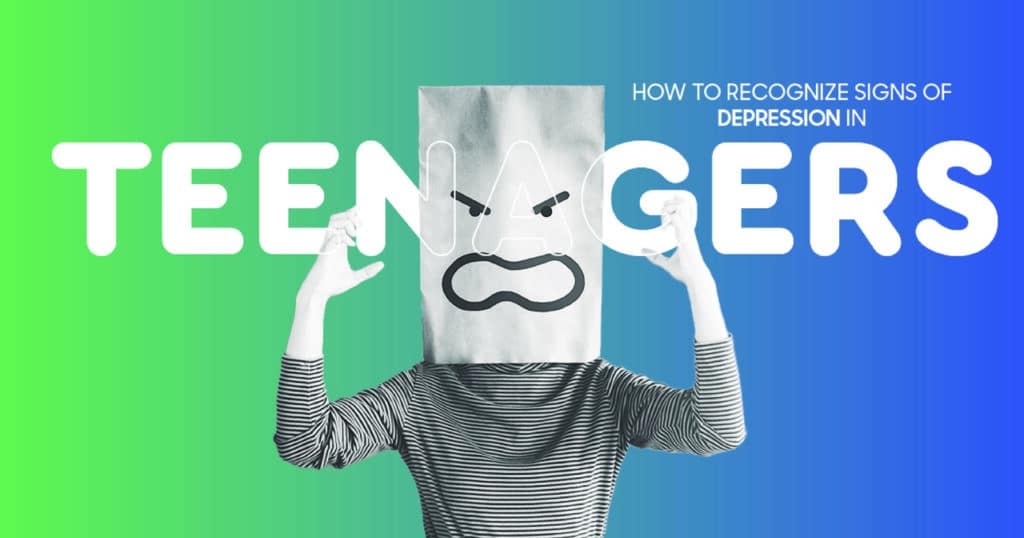As a parent, teacher, or caregiver, it’s instinctual to be concerned about the mental health of the teens in your life. Adolescence is a time of significant change-physically, emotionally, and socially-making. It is somewhat of a challenge to differentiate between what is simply a moody teen and more severe matters like depression.
Essential Takeaway
- Early intervention is the key. This means early detection of depression symptoms, followed by the right kind of consultation. It will make a big difference in the teen’s treatment process. So, be alert and trust your instincts if something is amiss.
- Depression among teenagers differs from that in adults. While some symptoms of depression include irritability, avoidance of activities, and sleep disturbances, these may be more prevalent in teens than what is characteristic of depression among adults. These cannot be misconstrued as normal mood swings.
- Support, Patience, and Communication. Teens require a support structure and open communication to overcome depression. Emotional support, patience, and professional aid would help them regain control over their mind.
This post is going to help you identify the symptoms of teen depression and offer tips on what to do if you suspect they are having it.
Understanding Depression in Teenagers
What Is Teenage Depression?
Depression is no longer the expression of sadness for a day or two but a more serious mental illness about the way someone feels, thinks, and behaves. Teen depression is talking about a condition where there are persistent feelings of sadness, hopelessness, and irritation for longer than an unusually long period of weeks or months. Teens are less likely to state their feelings clearly, so being alert to the signs is essential.
Teen depression can destroy every walk of life, be it their school life, social life, or even their bodies. But the good news is that depression is treatable, and recognizing the signs early on makes all the difference.
How Is Teenage Depression Different From Adult Depression?
Though depression can affect any age group, depression among teenagers is different from adult depression. In teenagers, it does not manifest through continuous sadness or lack of interest in activities as one might be familiar with among adults, but instead presents itself in the form of irritability and anger, mood swings, etc.
It is often overlooked because it’s concluded that “it is just a phase” or is normal for teenagers. The distinction will enable you to identify the symptoms of depression early enough before they get out of hand.
Common Teen Depression Symptoms
Depression can be represented emotionally in many ways for a teenager. Though sadness can be said to be the most universally known symptom, here are other emotional signs to look for:
- Feeling sad or hopeless. If you are a teenager who usually becomes sad most of the time without apparent reasons, this could be depression.
- Irritability or anger. In most teenagers, depression is displayed as irritability. A teen who consistently snaps at friends and family might be more than just experiencing bad moods.
- Worthlessness or excessive guilt. Teenagers feel that they are simply not good enough when depressed, even when there is no evidence for that at all.
- Loss of interest in things. A teenager who enjoys sports, art, or, for that matter, time spent with friends but suddenly ceases to find pleasure in it might be suffering from depression.
- Compositional problems. Depression often blurs a teen’s thinking, making it difficult to focus or decide what to do next.
Behavioral Symptoms of Teen Depression
Behavioral changes are often another leading indicator that something is amiss and their teen might be having a case of depression. Look for:
- Social Withdrawal. If your teenager suddenly seems less interested in hanging out with friends and family or engaging in any social activities they would typically do, something might be amiss.
- Poor Academic Performance. Depression often hampers a student’s ability to focus, recall information, and maintain interest in studies. Poor grades and dropping from extracurricular activities may follow.
- Avoiding Responsibilities. If a teenager discontinues taking care of their chores, schoolwork, or other responsibilities, then it could be the symptom that depression is making it difficult for them to function.
- Sleeping Excessively or Insufficiently. Depression often leads to sleeping problems in teenagers. This means they might have trouble falling asleep the whole night or sleeping for some period but remain sleepy.
- Harmful or Even Dangerous Behaviors. Some teens, to deal with depression, will engage in risky behaviors like drugs or alcohol, reckless driving, or harming themselves.
Physical Depression Symptoms in Teens
Depression does not only affect the emotional and behavioral life of the teen but can also be expressed through its physical symptoms. Here are some common physical symptoms of depression:
- Lack of energy or fatigue. Teens with depression tend to be easily fatigued. They may sleep for an entire night and yet still feel drained.
- Loss of appetite. Teenagers often cease being hungry or refuse to eat normally, or at times, begin eating much more than usual as a way of compensating for their emotional pain.
- Headaches, stomachaches, or any other unexplained physical disorders. Depression may sometimes present as physical pain or discomfort without an apparent cause.
- Inability to sleep. Both excessive sleeping and inability to sleep may be manifestations of depression. A drastic change in the teens’ sleeping patterns should not go unnoticed.
Differences Between Normal Teen Behavior and Depression
When Is It Just a Phase?
Teenagers are known for moods and phases of being moody; however, can you determine whether it’s just the usual angst of adolescence or something more serious? You should look at how long the symptoms last and how much they interfere with your teenager’s life. If their moods are short-lived and do not interfere with a daily routine, then maybe it is nothing more than typical adolescence.
However, if mood, behavior, or physical health changes have continued for more than two weeks, it might be depression. The critical thing to note is the gravity of the symptoms. If your teen seems overwhelmed, hopeless or sees nothing that could make him happy, it is time to get a closer look at this.
Duration and Intensity of Symptoms
Depression is not the same as a bad mood or having a rough couple of days. It’s a long-lasting sadness, hopelessness, or irritability lasting longer than two weeks. Consider how long their symptoms last and how intense they are to help you figure out if your teen might be suffering from depression.
For example, if your teenager appears sad for a few days but is back to their usual self the next day, this is probably not depression. In contrast, if they have been feeling sad for several weeks, have lost interest in activities they once enjoyed, or seem to have low energy most of the time, it could be depression.
Risk Factors for Teenage Depression
Biological and Hormonal Factors
Teenagers undergoing all those physiological changes and hormonal imbalances are an ideal battleground for depression. Besides these factors, the adolescent brain is also still under development, and some chemical imbalances in the brain might make one more susceptible to depression than another.
Your teen will also be prone if there is a family history of depression or other mental illness. That is something that you need to look into carefully if you see the signs of depression.
Environmental and Social Factors
Other contributing factors include external stress from other forces, which are either academically related, including bullying and peer pressure, or one is simply a social outcast. In some instances, the very same teenager excelling in class would end up depressed owing to parental pressure or pressure to perform almost flawlessly.
Such feelings can also be socially induced through social media because many teenagers become susceptible to comparisons or cyberbullying that makes them feel inadequate or lonely.
The Trauma and Life Influences of Social Media
Traumatic events can seriously threaten depression, especially in teenagers. Examples could include the death of a beloved one, grave illness, change of residence, or separation of parents. Even less dramatic changes, such as entry to a new school or breakups in romances, can cause depression in vulnerable teens.
How Depression in Teens Is Often Overlooked
The Role of Stigma
Unluckily, the stigma surrounding mental illness that sends a shroud around many people ensures that most teens do not open up about their problems. Chances are that they fear people will tag them as weak or judge them if they mention they’re depressed. It is important to create an open and supportive atmosphere.
Normalization of discussions about mental health may help teenagers open up about how they feel and ask for help if they need it, with an eliminated shame factor.
Depression Mistakenly Compared to Apathy or Laziness
Majorly because depression leads to low motivation and a lack of energy, a person might mistake it for laziness or disinterest. Skipping school, not doing homework, or avoiding social activities are signs that could make one think a child is being rebellious or disengaged. Instead, these behaviors may be seeking help.
If you notice these signs, do not label the teenager lazy or unmotivated. Find out how they feel about things, what is happening in their lives, and if something has been disturbing them lately.
How to Communicate With Your Teenager When You Suspect Depression
Creating a Safe Space for Conversation
Talking with a teen about depression can be very tricky. You never want to push too hard, but you don’t want to ignore it either, or it could make them shut down on you. So, one possible way of starting the conversation would be to set up an open, non-judgmental space in which they feel free and open.
Open-ended questions might include how they have been feeling lately or if there is anything they would like to talk about. It’s always a good idea to let people know you are open to their listening for a while and not there to judge or lecture them.
What to Say and What Not to Say?
How you communicate about mental illness to an adolescent is crucial because the way you phrase it may convey to that person that their feelings are unimportant. Avoid saying something like, “You’re just being dramatic,” or “You’ll get over it.” Instead, acknowledge their feelings with phrases such as, “I’m sorry you’re feeling that way,” or “That sounds like an adamant time.
Avoid comparisons, such as “You have it better than others, so why are you upset?” This makes teens feel guilty about their feelings and less likely to open up to the sentiment in the future.
When to Seek Professional Help?
If your teenager has been displaying some symptoms of depression for more than two weeks or if the behavior has become even more alarming, it is time to seek professional help. A mental health professional, such as a counselor or a therapist, will be able to evaluate your child’s symptoms and suggest a course of treatment, whether it be therapy alone, medication alone, or both.
The sooner depression is addressed, the better it tends to go, so trust your gut. If you are concerned about your teenager, then do not be afraid to seek help.
How to Support a Teen With Depression?
Encourage Healthy Habits
While professional treatment goes a long way in helping depression go away, you should not forget there are things that you can do at home to support your teenager. You could encourage them to develop healthy habits like regular exercise, nutritious meals, and healthy sleep patterns. Such small changes can make a big difference in their general mood and energy levels.
The Role of School and Extracurricular Activities
Depression can also be prevented in teens by maintaining a routine that keeps them in school and other extracurricular activities. Remind them to stay engaged but not overly involved. It is okay if the expectations need to be adjusted to allow them space when required.
Emotional Support and Patience
There is a need for emotional support. Be patient and let them know that you are there for them when perhaps they do not want to discuss it immediately. Let them realize it is appropriate to feel sad, angry, or frustrated and that it is not about loneliness.
Screening and Assessments
How Professionals Diagnose Depression in Teens
These specialists use assessment tools like psychological interviews, interviews, and questionnaires to diagnose depression. The above tools help mental health professionals understand the extent of depression and the best possible treatment course.
Therapy and Treatment Types
Therapy, including Cognitive Behavioral Therapy (CBT), is a widespread treatment for teenage depression. It will help teens better deal with negative thoughts and feelings. In some cases, this will also include medication to control an imbalance in brain chemicals.
A therapist will collaborate with the teen and their family to identify an appropriate individualized treatment plan.
Prevention Strategies for Teen Depression
Developing Robust Support Systems
One of the best ways to prevent depression is by building a solid support network for your teen. This means tight family ties, supportive friendships, and access to mental health resources. Teens who feel supported are less likely to develop depression or suffer from its more severe effects.
Promote Open Communication on Mental Health
Talk about mental health like an ordinary, everyday topic among your family members. Teens are more apt to open up if they hear these as standard parts of family conversation. Especially connect with them when they have a problem.
Establish Self-Care and Mindfulness
Teach the teenager about self-care. Assist them in learning ways of dealing with negative feelings, such as practicing mindfulness, journaling, or gratitude, which might help them during stress.
Knowing the Warning Signs and What to Do
Trust Your Instincts
As a parent or caregiver, you know your teen better than anyone. Trust that feeling and initiate a conversation if something doesn’t feel right. Depression is treatable, but only if it is intervened early.
Be Proactive in Supporting Teen Mental Health
If you suspect your child might be suffering from depression, do not hesitate further. Have a conversation with your teen; if needed, you can consult a professional in the mental health field. Share this article with other parents, teachers, and caregivers so that no teenager has to suffer in solitude.
FAQ’s
- Which of the following are common symptoms of depression found in teens?
Such a common manifestation in teenagers with depression is a chronic state of sadness, irritability, withdrawal from friends and family, changes in appetite or sleep patterns, decline in academic performance, and an assumed lack of interest in things they once enjoyed.
- How would I know if my teen is just going through a phase, or if it requires serious consideration?
Because mood swings are a usual condition shared by most teens at one time or another in their lives, if symptoms persist longer than two weeks, are severe, and/or interfere with daily life, it is probably depression. In any case, talk with your teenager and seek professional help.
- What should I do if I think my teen is depressed?
It calls for an open, non-judgmental talk with your teen over your concern and their perspective. If their symptoms persist, seek out a mental health professional who will establish an accurate diagnosis and treatment.
- Is teenage depression treatable without medication?
Yes, many youths derive the benefits of therapy, including Cognitive Behavioral Therapy (CBT), whereby youth can learn to stop engaging in a harmful way of thinking and consequently behaving. There will be times when medication may be required. Of course, that needs to be prescribed by a healthcare professional.
- What support can I provide to my adolescents when they suffer from depression?
Emotional support, good habits, open communication, flexibility, and showing them they are not alone are all important factors. That set of factors also involves professional assistance from a therapist or a counselor.




